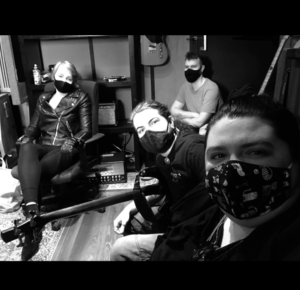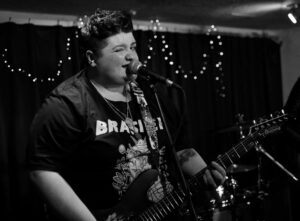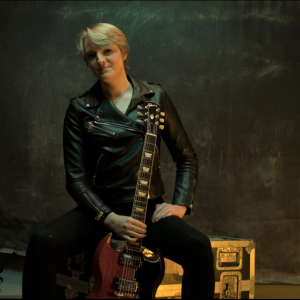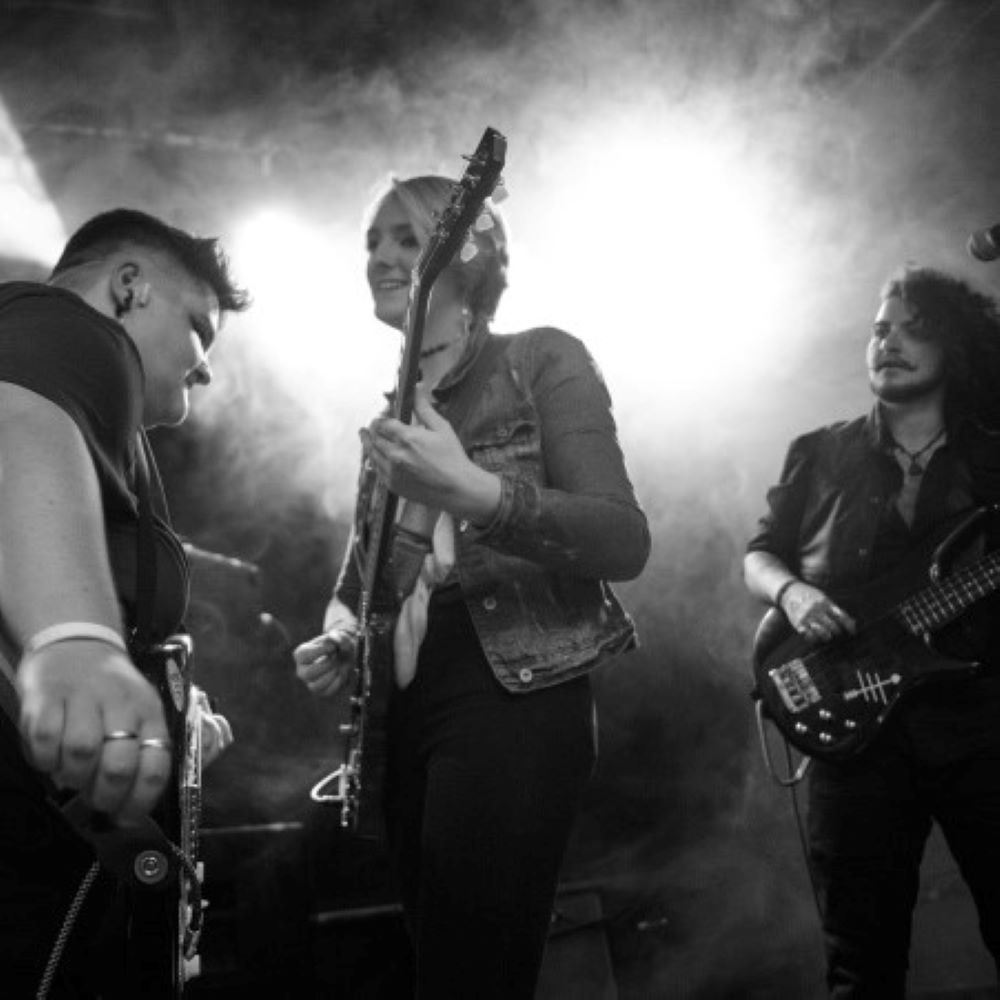During Pride month, Devin Valentine, Lucy Rose and Beck Lombardi, from queer, trans punk rock Southampton band Hunting Hearts talk about gender, perception and safety with In Common’s Sally Churchward.
Sally: Quite rightly, there’s been a lot of talk about street safety lately, particularly women’s safety, following the tragic death of Sarah Everard and ongoing trial of the police officer accused of her murder. What are your own experiences of feeling safe or otherwise, on the streets?
Devin: For the first 17 years of my life, I was perceived in the world as female and taught the sort of things you would expect – to be wary, to be safe, to protect myself from the things men might want to do to me without my consent. That is a lot of conditioning to shake off, so that now even though I am seen as a man by other people, I still have hangovers of those fears, though I am much less at risk from those specific things like sexual assault on the street, and certainly less of a target for street harassment. However, though I still have those fears, I have to be aware that now I can be seen at the same as the threat I am still residually worried about, and I have to adjust my behavior, and try not to abuse the power I have in the world because I am now seen as a man.
Sally: That must be such a challenging shift, especially at times when there’s a lot of dialogue around women’s safety and men’s collective responsibility.
Devin: Yeah, it happened very slowly, imperceptibly, but moments where the discourse gets louder are moments when I take stock of my position again.
Sally: What thoughts have you had on how to use the power you have as a man?

Devin: There are a few things I’ve been trying to do. Throughout my life I haven’t had many close friends who are cis men (men whose gender identity matches the gender they were assigned at birth). I felt a lot more comfortable around trans men, all women and non-binary people. But at some point around 2016 I started making the conscious decision to try to talk to cis men in the same way especially my friends, e.g. being more emotive with them, giving compliments, asking how they are etc, to try and normalise interaction outside of the standard, as I see it, gruff and impersonal way men are supposed to interact with each other. I think it also helps because it shows me, and them, what a real compliment is, so then you know how it’s different from harassment.
At first I felt I didn’t know how to talk to cis men, like I was missing the code I would have learnt in adolescence. But then I through ‘why should it be different, why can’t it just be the same?’ And that definitely made me feel a bit more comfortable around men. Like deciding I wasn’t going to change myself just to fit into the unwritten rules of how men speak to and act around each other.
Outside of that, I’ve intervened a handful of time in clubs pretending to be a brother or friend of someone being harassed or just putting my body between an unwanted persistent gyration from a strange man and my friends who wish to not be gyrated on. I was walking down Bedford Place, Southampton, one day and some men were leering and being loudly crude about a passing woman. I said something to them, I can’t really remember what, and they said “oh sorry didn’t realize she was your misses” and I was like “she isn’t, you’re just f-ing disgusting” and it was so telling that they were genuinely apologetic when they thought that woman was “owned” be me but became outraged once it was apparent I wasn’t her “owner” and I was just calling them out. The last thing I want though is to be praised for this behaviour because it should simply be the norm.
I kind of hate telling people about the times I’ve stepped in because it feels like I’m trying to get good man points. But what I really want people to get from this is that men can definitely intervene in some ways, but we really want to stop these behaviours before it gets to actual harassment. So that means rewinding and calling out your friends when they say sexist stuff. Luckily for me, but sadly for putting it into practice, as I said I don’t know many men and the ones I do are the sort who have not displayed that sort of behaviour, at least not around me. I want to add there are plenty of times when I saw something happening but I felt too scared to say something, this was fairly minor things like a group of men at the bus station on campus vocally leering at a woman just getting off the bus and walking away. I remember thinking I could say something but I was afraid because there were more of them than me… and this brings me back to my issues again around still feeling like a target even though I’m not, sometimes it is hard to know if it is safe to intervene vs the harm being done. There is also the case to consider of being a “white knight” and taking agency away from women when stepping in, which brings me back to intervention earlier, intervention at school age, better education about appropriate behaviour. But that’s a wider discussion outside the scope of my particular view of things as a trans man.

Lucy: Following on from this, I feel similarly uncomfortable around cis women. Perhaps, like you Devin, I missed out on that gender training, as it were, during adolescence, but I also find that I keep comparing myself to their cisness and finding myself lacking because I’m trans. For example, all the products of my original puberty are things I must keep on top of, constantly, to maintain my presentation, but that’s not something they have to deal with, and if I fall short or get lazy, I’m only reminded of how different I am.
Because of this, I’ve never felt like I belonged to the world of women and have never been made to feel like I belonged. I’ve heard all the ‘transwomen are women’ thing, but words aren’t the same as action. This may change in time and after upcoming surgeries/treatments, but that’s the state I’m currently in, not helped by the hyper sexualised image of femininity in advertising where everyone is a supermodel and an impossible point of comparison.
Devin: Just going back to the question, I try to take a step back, especially in situations where I am perceived as cis, and try to remember that people are probably going to subconsciously give me more time to speak, and women are more likely to let me talk first if we both talk at the same time, so I’m trying to correct for bias in a room but that’s definitely something I’m still working on, because it still feels new that it’s happening to me if that makes sense. Things like being offered emotional support and help, which is also tied to my other privileges such as being white, and having a socially acceptable body shape and somewhat conventionally attractive face.
However, when I am known as trans, some attitudes change towards me – among cis women specifically. I’ve definitely been treated like the desexualised gay friend, someone who is not a threat – I don’t want to be a threat, but I want that to be because of how I am known and from my actions rather than being trans. People drop their guard, I feel a little like I’m seen as “male lite”, maybe because they assume I don’t have a penis or the same physical strength as a cis man. That’s also dangerous for people to fall into because it gives me more power in some ways, because these individual’s guards have dropped. Trans men can of course be dangerous in an abusive way and or violent way. It’s kind of like penis = danger, which hurts trans women and AMAB (assigned male at birth) non binary people too, and I definitely 100% feel like I’ve gotten that impression from cis women before. Again, I want to stress that I like being seen as a safe person, but I want that to be because of who I am as a person rather than because of my status as a trans man. Of course all I’m saying about the above applies to AFAB (assigned female at birth) non binary people too as I’m sure Beck might agree with and feel similar.
Lucy: Yeah, leading on from an above point, a lot of cis-women do not like trans-women, from my experience, for the exact reason Devin says. They still see the little of the AMAB left in me and see that as a threat (to them and/or their personal identity as a woman which they see as exclusively theirs) or something they don’t like/want. For example, I could be on a dating site (my gender clearly stated), and I bring it up in conversation, they twig what they hadn’t realised, and then they scarper for the hills.
Devin: It’s like they really have bought into the messaging that a penis has a mind of its own and the brain above has nothing to do with it. And of course the rude assumptions about what someone has in their pants.
Sally: Do you find people, or certain groups of people, act as gender norm gatekeepers? For example, I’ve encountered transgender people being coached to fit into gender stereotypes, such as women not speaking loudly, by those aiming to support trans people. It felt like trans women, in this instance, were being made to feel they had to squeeze into a very restrictive box, which the feminist movement has fought hard to break down. To me, narrow gender definitions hurt everyone, be they trans, nonbinary or cis. Is this something you have found?
Lucy: A little yeah, not so up front as those lessons, but definitely subconsciously. You know how over time a person’s accent changes to suit the place they’re in to find acceptance as one of the crowd, I think it’s similar to that. So, my movements, my demeanour, my voice, all that stuff wasn’t taught to me, but I picked it up from watching women out in the world and on TV and have amalgamated myself into the feminine standard not by force but by assimilation. That being said, I have been victim of gender role stereotyping before, like being asked to make coffee , or having men direct technical talk to other men even though I’m there and easily smart enough to handle whatever they’re talking about, or being excepted to be the one to tidy up.
Devin: I remember the classes you mentioned, and having similar gripes with their narrow definitions of gender. It felt very much like a cis person’s genuine but misguided attempt at helping. Luckily things have changed a lot in that organisation and they have moved on from that sort of thinking!
Sally: Thinking about street safety, how do you typically feel in terms of safety when walking alone after dark, and what are some of the factors that influence how you feel?
Lucy: Day to day, safety wise, I feel okay. I don’t go out that much at the moment so have almost forgotten what it’s like, but when I do, I think nothing of it. But after dark, I do have to be more cautious, keep looking over my shoulder, hand near my phone, and always conscious of what I’m wearing, say if it’s a warm summer night or a evening on the town. Those kinds of outfits always pose a greater risk and I have to measure how good they make me felt against the attention they garner.

Beck: I rarely go out after dark without driving a-b so I don’t really find myself in a position to feel a way about it. However the idea of walking alone at night anywhere does frighten me; regardless of looking quite masculine I do not feel safe. I’m not sure whether that’s to do with worrying about people perceiving me as female and then engaging in an abusive way with me or fearing that they’ll engage in homophobia/transphobia. Either way the fear is definitely there.
Devin: I still feel worried about walking out at night, I will do it, and logically I know I’m not as at risk now of sexual assault but deep in my subconscious there is still that fear. It’s hard to remember that I pose a threat now instead. I’ve definitely double thought certain interactions, like I was riding home one night very late around 3am and saw a woman alone on the bridge. I didn’t stop because I didn’t want to scare her, but eventually I did turn around just to see if she was still there; but even that action could be seen as predatory or aggressive. I was just worried about someone being on that bridge so late, and I would feel terrible if I contributed to someone in a crisis feeling unseen/unimportant. She had moved on luckily.
Beck: I’ve noticed my whole life that when people who are AFAB present in a masculine way, it’s seen by cis men as a challenge. It’s the same when two women are in the street together and are not shying away from being together – it’s seen as appropriate by some for a guy to be ‘you need to find the right man’. Again, it’s seen as a challenge.
These are some of the people who are often left out of the narrative about street safety. Trans people of colour are the most at risk of violence and murder but they so often get left out of the narrative. It almost feels like no one cares – like ‘of course people will be targeted for being trans, for being a woman of colour and so on.’
Lucy: Most of my experience has been perceived as female, rightly so, and harassed in some regard because of it. The one that caused me most hardship was being in an office in sales and having all the men speak of birds, chicks etc, I had to pretty much shout down my boss for using that language. I wore a skirt one day without tights, and I was pulled aside by HR saying what I was wearing was inappropriate. That caused a lot of emotions because the rhetoric they used was the same used when trying to excuse rape – ‘what do you expect, wearing that’. My value was bound to my clothing, it’s my fault I’m viewed as a sexual object by men. I told them that. It didn’t help.
Then being trans as a challenge, I sometimes get that sense from cis women, as though they are defined by their hardship as a woman, because they have suffered these things, and I am butting in on their turf, as if I’m lessening the validity of their identity but no we just have shared experiences.
Beck: Picking up on that, it seems like for somebody as entitled as a cis white straight guy, there is no wrong time, because ‘how on earth can my sexual advance not make your life better? If you’re sad, don’t worry, because I find you attractive, or if you’re having a good night, I’m here to make your night even better.’ There’s no thought about how an advance could be taken negatively. It’s pure hubris, but I really wish that it was hubris and the part came where it condemns them.
Lucy: There’s the attitude that they are the next Adonis, and if they take an interest in you, you are somehow more worthy.
Beck: Because of gender inequality and gender based violence, the focus is not on the violence and inequality, the focus on the gender part, so then we start splitting people by gender, even down to CIS vs trans and even then, there can be like trans vs non binary. Like “you’re feminine presenting but you don’t actually identify as a woman. We identify as women” and then you get the CIS women saying “We actually are women”. It’s further segregation and it’s subliminal divide and conquer. To make a real difference, we have to start letting everybody sit at the table.
I imagine the narrative is even worse for anyone who uses a wheelchair or anything that may be perceived as a weakness – and I’m not saying it is but it might be perceived that way by someone who is predatory – so in order to have this discussion, we need to invite everyone to the table, and that includes CIS gay men, trans men, and so on. We can’t silence each other, because if we do that, we won’t make a difference. The intersectionality of this discussion is paramount.
Lucy: I’m going the other way to Devin. I was in that boy culture, chase after girls atmosphere at school, where the popular girls and the jocks are the most valuable people and then I’ve come to the female side and seeing how that behaviour is perceived, what that behaviour I was almost subconsciously taught as a kid can become and how it can be felt. And I think because of that and because I’m relatively new to the gender, because I’m an AMAB, I think I’ve felt it more keenly, because it’s not something I’ve had to feel before, it’s not been normalised for me. I think that’s why when I had that experience in the office about my clothing, I felt it quite profoundly, because it was a woman who was saying it to me, the HR woman, and to her it was just another day at the office and I was like ‘no, this is not normal, women shouldn’t be seen this way’.
Sally: What sort of stereotypes have you felt pressured to conform to, if any?

Beck: The androgynous stereotype is skinny, white and masculine, but born female. People don’t talk about AMAB non-binary people much, or non-binary people of colour, or feminine-presenting non-binary people. The main non-binary presentation you got right in the beginning was robots and aliens and even now you have cartoons that have really great lgbt representation but their non binary person is a shape-shifter. There’s a focus on non-binary as a transient identity or an identity that has no gender, like robots. When we think about robots, we think about polite, white pleasing individuals; that’s usually how they’re voiced.
When that’s handed into human territory, an AFAB person who identifies as non-binary, who is white and masculine is the closest thing you can get to a CIS white straight male as a non binary person, really. So the closer it is to that, the more palatable it is, and that’s where it comes from, it comes from the media.
I find myself everyday trying to conform to that. Yes, I was born and socialised as female, I was told I was female. I dress and act masculine. Inherently, though, being a bigger person, people read curves on my body as feminine, and that’s really difficult. The size of my body impacts my dysphoria. I could talk about it for hours. There’s a lot of pressure. I felt pressure when I was young, for my prom and my mum’s wedding, to be really really girly. I grew my hair out, I wore a dress.
Lucy: I grew up presenting as male until my early 20s. For all that time, I was trying to conform to the male stereotype of being slim, athletic, handsome, the kind of guy girls want. I never managed it. I even went to the gym for a couple of years and bulked out, if you can imagine. I was always trying to aspire to what other people were and the stereotype of that gender. Then when I came out, I went full trying to be a supermodel. Long dresses, lots of make up, lots of jewellery, presenting as hyper feminine, almost as evidence that I was female. Then I have swung back a bit. I’d say I’m in that female androgynous zone, that’s where I like to be. I can put on a dress if I want to but that’s a lot of effort and then we get into imposter syndrome, where especially with women, the media depiction around women is so sexualised that you can’t look anywhere without seeing the ideal form and comparing yourself to it. I could be watching a film and then flowing raven haired beauty comes on screen and I think ‘is that what I’m supposed to be like?’. I could sit here for hours doing my make up, wear my nicest dress, and I wouldn’t feel anywhere close. It feels like to me, because the pressure is so much to conform, that to reach the stereotype of my gender is an aspiration, and for that reason I feel out of place amongst cis women, especially evident in salons, where it’s so beauty focused and for the most part, the people who work there are young attractive women, and I feel very out of place.
Beck: To me, being trans inherently makes nowhere a safe space. If we take Lucy as an example, if she’s on the street and she’s perceived as female, she’s at risk of sexual assault. If she’s perceived as trans, she’s at risk of transphobic assault. She couldn’t guarantee going into a salon and being protected if she was assaulted and treated with respect, because she’s trans. Not only does being a trans woman put you at the same risk of assault as cis women, it can also take away that safety blanket of community.

Lucy: I’m very fortunate in that I appear quite feminine so I don’t often encounter the transphobic thing but I do encounter a lot of the abuse directed at women, as a trade off.
Because I started transitioning a few years after my original puberty had finished, I have all the baggage that brings. There’s constant maintenance, facial hair, body hair, muscle mass, constant maintenance of who I am to feel that I am trying hard enough to warrant my gender. The pressure is from everywhere. You can’t go anywhere without seeing a billboard with a model on it.
Beck: It’s difficult because to say this feels like I’m further dividing cis and trans women, however for a cis woman not to shave her legs and to cut her hair short, her femininity may be in question, but her being female isn’t, whereas if it was a trans woman, her whole gender is up for question. It’s like you don’t have a natural stake in this.
Lucy: I felt this especially in lockdown. You get lazy. If I go two weeks without shaving my legs or a few days without shaving my face, I start to feel like my entire gender is slipping because of that. I don’t have that original biology to back me up. My entire gender, to the average person, is all surface level. It’s all they can see. It’s not ‘I am female in here therefore I am female’, it’s ‘I am female out here, therefore I am female’, and if that’s not up to par that (my head) is not up to par. In lockdown it was so bad I had to go to my parents for a month of self care and self maintenance. I have to work constantly on my gender to meet the expectations of conformity.
Devin: For me I remember quite keenly when I came out that I didn’t want to hop from one box into another, that is to say, to try hard to be super masculine just to pass and “fit in”. I knew I wasn’t the sort of person who was going to fit in, I never had been, gender aside, and I wanted to take the opportunity of coming out as who I really am, to actually fully be who I was without the baggage of expectations. I remember my mum once said I should get into football to make it easier to fit in after I came out and I was just like… ‘No… Why do I need to pretend?’ Even if it might have been harder to “pass” or fit in as male at first doing this, I was being true to myself, and that was the whole point. Coming out as a trans man was definitely not for the benefit of anyone but me, so I wasn’t about to reduce myself to conform to male expectations. Well, that being said, I did feel like I had to cut my hair, and I am pleased to be at a stage in my life now where I can have long hair – longer than most people I know – and feel comfortable with that.
But now I am fine with wearing makeup, wearing nail polish, being attracted to men, in a way I wasn’t before. When I was closeted, I totally repressed my “femininity” because I hated it so much, I really did. But now I am settled into the boots of who I am, I have felt way more comfortable embracing my femininity. Or rather what society perceives to be femininity. I get my hands oily from fixing my motorcycle, come in, clean them, and sit down and do embroidery with my cats. I love that freedom, I feel most cisgender men don’t have that because of the pressure put on them to conform.
Sally: It feels to me that not feeling safe walking down the street and not feeling OK if you haven’t waxed are part of the same continuum. So what do we do?

Lucy: I would start with education. In school, definitely. I had one sex ed class when I was younger. Only one. Education, encompassing the entire spectrum, making kids aware with gender that you can feel the way you feel and you’re fine and you’re accepted and you’re a beautiful human being. And going into boardrooms, to CEOs and educating, because they’re mostly cis white men, educating them on company policy, how they can be perceived, how to treat people, giving staff the proper routes for complaints etc. That can go to police and council reform, street safety. So many rapes and assaults go unreported because people don’t think they have a leg to stand on because there’s not a place to speak about it and even if they do, there’s a sense the assaulter will be given leeway. That needs to change too.
Beck: I think it starts with education, with the breaking down barriers with young kids. It’s difficult, because how can you teach children not to treat each other differently because of gender, but also at the same time, make sure that cis male kids are taught to respect other people?
Lucy: Maybe you need to remove gender from that discussion almost. You are who you are, don’t assault anyone!
Beck: It also starts with conversations like this because you’re speaking to people who have been excluded from this narrative. It’s about someone reading something like this and thinking ‘oh wow, I never thought about things like that’ then they go to their next meeting and they’re like ‘now I’m thinking about it and it’s playing on my mind. I’m thinking about someone else’s perspective’.
Lucy: That’s part of the reason why I did the article series (Transgendered Substantiation, about transitioning) not just for people going through it but for people on the outside, giving them the inside scoop, as it were. That’s also why at my current job I’ve been vocal about being trans and about why being an ally is such an important thing.
Beck: It’s about a reformation of infrastructure really. Let’s start again and not do that thing where we decide we should be categorised by genitals. It’s really difficult because ideally it would be a complete do over. Going forward, we need to educate children but in terms of adults, we need to be having these discussions as publicly as possible, and with as many people as possible. We need a big table that everyone can sit around and time and respect to be heard.
Lucy: And to inspire those who do hear and think of the other perspectives so they get into places of power, so politicians aren’t misinformed cis people making big policy decisions for a group of people they haven’t been educated about.
Beck: It’s difficult because also, we’re white trans people. You’d have a very different discussion if you were talking to trans people of colour or disabled trans people, or both. It’s about that. It’s about intersectionality. People get like ‘that’s too many perspectives’ but if you’re not talking to everyone, you don’t know what the best for everyone is. You cannot make good decisions about people you don’t listen to. The government currently is a series of unfortunate decisions that seem to be ‘ uninformed.
Lucy: Liz Truss is horrible for trans people with wanting to get rid of puberty blockers for young trans people and dropping the reformation of the GRA and the compromise they came to was getting a GRC slightly cheaper. There’s such a narrative, especially in politics, that the transitioning process is quick and easy. We want people to give time to make up their minds and get the right information’. A, that’s what puberty blockers are, and B, it’s not quick and easy. I had a quick time of it, relatively, compared to people going through it nowadays, and it took be 1000 days to go from referral to hormones. I want to sit Liz Truss down and say that’s the reality of what it was when it was ‘easy’ and now you’re making it harder.
To get hormones you have to be able to prove you’ve been presenting as your gender for two or more years. Even when I went for my referral to the surgeon discussions, this was last February, even then I had to prove I was living as my gender, and that was about five years into the whole process.You shouldn’t need to prove yourself to get help.
Beck: In order to feel safe, we need to feel that we’re taken care of by the government – that our needs are met and that our interests are held as important, but when our healthcare isn’t even looked upon as a priority, of course we feel alienated and that adds to the feeling of being unsafe in the streets, because of course, if you have a trans person who identifies as a woman and presents as feminine and is sexually assaulted, would they be treated with the same emergency.
The fact of the matter is if you didn’t have this abusing of power and segregating of society so people can’t rise up against the power, there wouldn’t be the same kind of government. We would understand each other more, and it’s not even about understanding at the moment, it’s about listening to one another. Everything leads to everything else because it’s all a product of the patriarchy and capitalism. It’s difficult because you want to focus on one thing, but that happens because of this and this happens because of that.

Devin: It’s difficult, because one thing feeds the other. Capitalism really benefits from traits such as individualism, lack of empathy, greed. You will get ahead if you care more about yourself than anyone else. And apparently, those are desirable masculine traits. But as the pandemic has shown, actually we are a community of people and what hurts one of us can potentially hurt all of us. You would hope there is a lesson to be learnt there; that healthcare is a huge priority – even if you are a selfish person, you should selfishly want to ensure people are able to access healthcare because otherwise situations arise like this where people had to go to work sick, spread the virus, because they would have been evicted otherwise or missed bills or been unable to feed themselves. I know that happened more in the US, but there are so many examples of situations like that where people had no choice to be safe because of how financially unstable our society is. And so similarly with gender, these things that hurt us actually impact everyone. Like I was saying, you know, men are expected to be stoic, unfeeling, strong no matter what, or they are weak and don’t deserve to be called “real men”. But surprise, men are human… And look at male suicide rates because of these messed up expectations. If we elevated and destigmatised things that are seen as feminine, like being kind, caring, nurturing, empathetic, feeling, then male suicides would absolutely come down. So it’s in everyone’s interest to break down these stupid barriers. I wish people could just care for more altruistic reasons, but so many of us are conditioned to “look out for number 1,” so you really have to appeal to how it would benefit them personally to change these things, otherwise they think they will be harmed by equality in some way.
Sally: What could we do right now, practical things, to make things better, to make people feel safer and be safer?
Lucy: A lot of my perspective is from the trans side of things rather than the street safety, but write to your MP about everything. If you don’t speak up, you won’t be heard. Research and one thing that would really help would be if the government funded healthcare.
Beck: Street safe wise, I think starting and maintaining intersectional support groups, and carrying that ethos out with you into the street. If you see somebody who is being harassed in any way, there is a method, so if see someone bearing down on someone else, maintain your own safety but if you believe it’s safe enough, going up to someone on the receiving end of abuse, pretending you know them, trying to remove them from that situation non violently, to stop it in the tracks. I’d rather be in a situation where I have a moment of social anxiety and say ‘oh I haven’t seen you in ages’ and go over than turn and walk the other way and later on hear that person was killed. It’s all about assessing if you’re in a safe enough space. It’s about shining a light on it.
Devin: Speak up, don’t let things slide, in your family, with your friends. Sexism, racism, ableism… These can be difficult conversations to have, so it’s important to be informed before you have them, before it comes up, so you can communicate in a way that won’t shut the other person down into a defensive position. Don’t leave the work up to the people being oppressed, but at the same time, you have to listen to those voices to get the right information – there’s so much out there online, in so many formats, there’s books, there’s documentaries, YouTube channels, blogs… So many ways to learn things. It’s a process, and none of us are ever going to be done learning about other people’s experiences – we will only ever fully know our own, and that’s ok – because as long as we listen we can be better allies.
Sally: It seems to me that it’s only through intersectionality that we can smash the glass ceiling – otherwise you will only get so far on your own and you’re leaving the structures that oppress you in place. So even selfishly, it doesn’t make sense to leave others out.
Beck: Yes, you can’t shatter bullet-proof glass with one bullet.
Lucy: A lot of these problems stem from capitalism and the patriarchy. The problem with any power system is it wants to keep its power and the status quo and that happens with putting ceilings in front of people.
Devin: Absolutely, which is why we won’t see education reforms in the right direction, or anything like that which would rock the boat in these systems of power – because the people who benefit from our ignorance of each other, the people who benefit from us divided, they only stand to lose by changing things. The system isn’t broken, it’s working perfectly – the people with the money and power get to keep it, and we all have to fight each other for the scraps. It’s up to us to change things. It starts with how you interact with other people, it starts with us and our compassion and empathy. Believing we can be better.
Beck: I make sure I’m listening to people. That’s where a lot of my knowledge comes from.
Lucy: My primary thing is to speak out. When I first came out, I didn’t want to have to be the person shouting from the rooftops about trans rights, I didn’t want it to be about the fact I’m trans in every conversation, but as time has gone on, I’ve realised that’s not possible. The fact that I’m trans, at least in society as it is now, is inescapable.
Beck: You are in an LGBT anti-capitalist band…
Lucy: Exactly! I can’t go anywhere without talking about it, being reminded of it or feeling negatively because of it so I try to empower myself with it as much as I can – speaking out, being in Hunting Hearts, inspiring equality and diversity at my work.
For more information about Hunting Hearts, visit: https://www.huntinghearts.uk
June is Pride Month. For more information about Pride, visit: https://www.stonewall.org.uk/our-work/campaigns/pride-free-be-us

